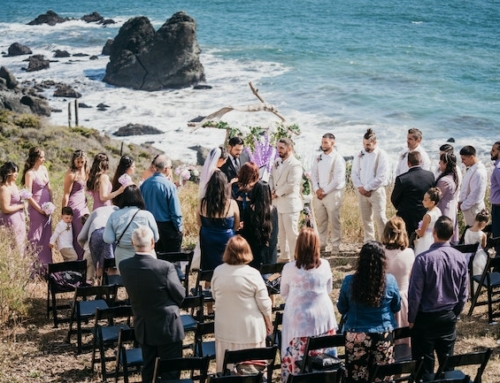Destination weddings have become a popular trend among couples looking for a unique and memorable way to tie the knot. Unlike traditional weddings, which are usually held in the hometown of the bride or groom, destination weddings take place in a location away from home, often in a beautiful and exotic setting.
While destination weddings can be romantic and exciting, they also come with their own set of advantages and disadvantages. In this article, we will explore the pros and cons of having a destination wedding, to help you decide if it’s the right choice for you and your partner.

Pros of Having a Destination Wedding
Unique experience
Destination weddings offer a unique and memorable experience for couples and their guests, as they provide an opportunity to celebrate in a new and exciting location.
More intimate affair
Destination weddings often result in a smaller guest list, as not everyone may be able to travel to the location. This can make the event more intimate and allow for more quality time with loved ones.
Built-in honeymoon
Destination weddings often double as a honeymoon, as couples can stay in the location after the wedding to explore and enjoy their time together.

Reduced stress
Some couples find that destination weddings are less stressful than traditional weddings, as they offer a simplified planning process and a more relaxed atmosphere.
Unique photo opportunities
Destination weddings provide unique backdrops and scenery for photographs, creating stunning and unforgettable memories.
Combined celebration
Destination weddings offer an opportunity to combine the wedding celebration with a vacation for the couple and their guests.

Cost savings
Depending on the location and size of the wedding, a destination wedding can sometimes be more cost-effective than a traditional wedding, as the guest list may be smaller and the couple may be able to take advantage of package deals offered by resorts or hotels.
Cons of Having a Destination Wedding
Cost
One of the most significant cons of a destination wedding is the cost. Destination weddings can be quite expensive, not just for the couple but also for their guests. Couples may need to pay for travel expenses, lodging, and other costs that they may not have to worry about if they had a wedding closer to home. Guests may also need to take time off from work and may have to spend a considerable amount of money on travel expenses, which could limit the number of people who can attend.
Planning
Destination weddings can be more complicated to plan than traditional weddings. Couples may need to work with vendors and venues that they are not familiar with, and they may not be able to visit the location as often as they would like. This could make it challenging to ensure that everything is in order for the big day.

Logistics
Logistics can also be a challenge with destination weddings. Couples may need to navigate different time zones, language barriers, and cultural differences, which could make it more challenging to plan the wedding and communicate with vendors.
Limited control
Couples may also have limited control over certain aspects of their wedding if they have a destination wedding. For example, they may not be able to select their preferred vendors or may have to compromise on certain aspects of the wedding due to the location.
Guest attendance
Another potential con of a destination wedding is that some guests may not be able to attend due to travel expenses, work schedules, or other commitments. This could make the wedding less enjoyable for the couple if some of their closest friends and family members are unable to attend.

Legal requirements
Depending on the destination, couples may have to navigate legal requirements that could make planning the wedding more complicated. For example, some destinations may require couples to reside in the country for a certain amount of time before getting married or may have other legal restrictions that could impact the wedding planning process.
How to Decide if it’s Right for You
- Consider your budget: Destination weddings can be expensive due to travel costs and accommodations, so it’s important to determine if it’s feasible for your budget.
- Think about your guest list: Not everyone you invite may be able to make the trip, which can affect your overall guest count and dynamic.
- Consider the logistics: Planning a wedding in another location may require more coordination and research to ensure everything runs smoothly.
- Think about your priorities: Consider what is most important to you and your partner when it comes to your wedding day. If having a small, intimate ceremony in a tropical location is a priority, a destination wedding may be a good fit.
- Evaluate your expectations: Be realistic about what you want out of your wedding day and how a destination wedding may meet or not meet those expectations.
- Consider the legal requirements: Different countries have different legal requirements for getting married, so it’s important to research and plan accordingly.
- Think about the experience: A destination wedding can provide a unique and memorable experience for you and your guests, but it’s important to consider if it aligns with your vision for your big day.

Tips for Planning
When it comes to planning a destination wedding, there are a few key tips to keep in mind:
- Research venues and vendors carefully: It’s important to thoroughly research potential wedding venues and vendors before making any decisions. Look for reviews from past couples and consider reaching out to local wedding planners for recommendations.
- Use a local wedding planner or coordinator: Working with a local wedding planner or coordinator can be incredibly helpful when planning a destination wedding. They will be familiar with the area and can help you navigate any potential language or cultural barriers.
- Provide ample information and resources for guests: When planning a destination wedding, it’s important to provide your guests with all the information they need to make travel arrangements and plan their stay. This could include information on flights, transportation, accommodations, and local activities and attractions.
- Plan a pre-wedding gathering or activity: Consider planning a pre-wedding gathering or activity to help your guests get to know each other and the local area. This could be a group dinner or activity like a city tour or beach day. It’s a great way to kick off the wedding festivities and create a sense of community among your guests.

Final Thoughts
When it comes to deciding whether to have a destination wedding, it’s important to make an informed decision that aligns with your unique situation and desires. While a destination wedding can be a magical and unforgettable experience, it’s not the right choice for everyone. Before committing to a destination wedding, it’s important to consider the pros and cons and weigh them against your personal preferences and circumstances.
If you do decide to have a destination wedding, it’s crucial to plan carefully and use local resources to ensure that everything runs smoothly. Research venues and vendors thoroughly, and consider hiring a local wedding planner or coordinator who can provide valuable insights and expertise. It’s also important to provide ample information and resources for guests, including travel arrangements, accommodations, and local attractions.
Ultimately, the decision to have a destination wedding should be based on what feels right for you and your partner. By taking the time to weigh the pros and cons and plan carefully, you can create a wedding experience that is truly unforgettable.










